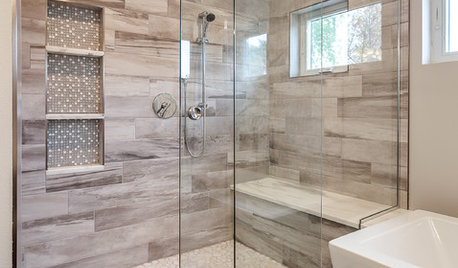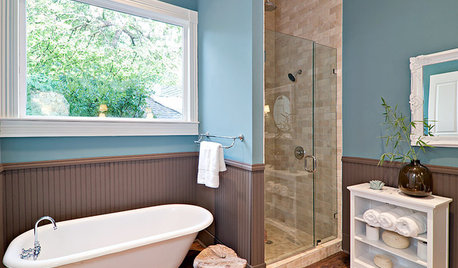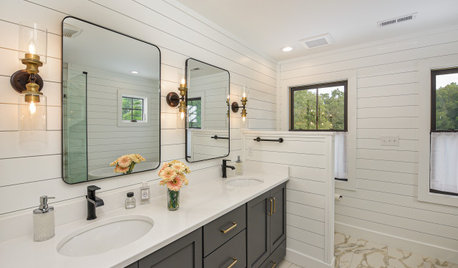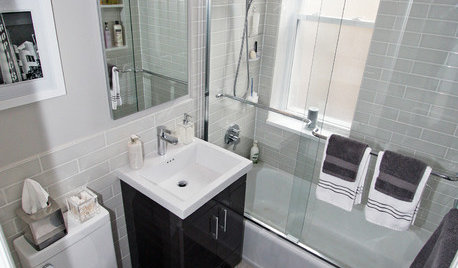Permit for a bathroom surface remodel?
We are remodeling all three of our bathrooms, as well as doing some additional remodeling work (HVAC overhaul, tankless water heater for one side of our house, new floors, new exterior doors, etc.). Two of the bathrooms are just pure surface remodels (i.e., replacing tile, new toilets, new vanity, new faucets and shower head). The third bathroom is a more extensive remodel and will involve removing a jet tub, expanding a shower, and moving plumbing around (but no structural changes).
I called the City Building Department yesterday to inquire about permits for a portion of our project (the HVAC overhaul and the tankless water heater, and the third bathroom extensive remodel). In the course of discussing these things, I discovered that our city requires a permit for any work that you do, other than painting and replacing floors. So, even if you just wanted to replace your faucet, re-tile your shower, or even replace a light fixture, you would need a permit. This seems absurd to my husband and me. I think it's just a way for the city to make money. While we are fine with getting a permit for the third bathroom, the HVAC, and the tankless water heater, we were not intending on getting a permit for the surface remodels of the other two bathrooms or any of the other minor work we're doing. The remodeling on these two bathrooms is scheduled to start in a week.
Our contractor (who is quite reputable), agrees that we "technically" need permits for the surface remodel bathrooms, but doesn't think we should bother with them since the city will never know whether we remodeled these. I'm wondering if anyone else lives in a city that has a similar ridiculous requirement, and, if so, whether you have bothered to get permits for your basic remodels. Is there any real downside to not getting a permit for these things?
(Btw, apparently we were even supposed to get a permit for replacing our standard tank water heater that went out on us a month ago. I guess the city expects you to be without hot water while you go through the bureaucratic process of trying to obtain a permit.)
Comments (33)
alexagrn
Original Author10 years agoJewel, thanks for the feedback (and sympathy!). Both of the potential downsides that you have raised have crossed our minds. I'm a little more concerned about the second scenario you raise than the first. With respect to selling the house, I think we're willing to take the gamble that most potential home buyers will either not know or care about permits for new tiles, a new vanity, etc. But, yes, there is definitely some risk there.
I'm more concerned about the inspector noticing other improvements when they inspect the permitted work, but our contractor has assured us this shouldn't be an issue because the inspector will have no reason to enter these bathrooms and we can just keep the doors closed.
I agree that a grassroots movement may be in order. I forgot to mention another ridiculous new law that the building inspector told me about: As of two days ago, if a homeowner wants to replace one water fixture in the house, it must replace all water fixtures in the entire house to ensure that everything is water efficient. So, for example, if you want to replace a toilet in one bathroom, you have to also replace every other toilet in your house as well as every faucet and shower head. And, of course, you need a permit for all of that. Completely insane!
Related Professionals
Hammond Kitchen & Bathroom Designers · Ridgewood Kitchen & Bathroom Designers · Apple Valley Glass & Shower Door Dealers · Atlanta Glass & Shower Door Dealers · Suwanee Glass & Shower Door Dealers · Vallejo Glass & Shower Door Dealers · South Miami Heights Glass & Shower Door Dealers · Bon Air Cabinets & Cabinetry · Richardson Cabinets & Cabinetry · Universal City Cabinets & Cabinetry · Phelan Cabinets & Cabinetry · Aurora Window Treatments · Chicago Window Treatments · Littleton Window Treatments · Sayreville Window Treatmentsjewelisfabulous
10 years agoNo way!! That's absolutely ABSURD. It almost sounds like city council members are passing such requirements because they're getting kick-backs from building supply companies or the trade unions.
writersblock (9b/10a)
10 years agoYes, that's pretty much the status where I live, too. Basically folks around here keep voting for cost-cutting/tax reduction measures, and so the permitting fees which were once just gravy have become a significant part of the county budget, so they not only have many more and higher fees, but enforce them a lot more stringently, because they've lost so many other sources of funds.
chispa
10 years agoYou must be in CA! I don't think that your last paragraph can be correct. You can't force someone to replace every old water fixture, that still works fine, just because they have one broken one.
Also in CA and carefully reviewing if we will get a permit for out master bath gut/remodel. Mostly it involves new tile everywhere, but also moving the tub faucet and drain over a few feet.
sjhockeyfan325
10 years agoYou can't force someone to replace every old water fixture, that still works fine, just because they have one broken one.
Sure they can, and they do (until someone "fights City Hall" and wins). We just remodeled a condo and had to replace every single outlet below 52" with tamper-proof outlets, even in areas where we were doing absolutely no other work.
jewelisfabulous
10 years agoI shared your situation with my husband. He suggested that you have the contractor hold off on doing the surface improvements after the city codes inspector has already inspected and signed off on the work on bath #3, the HVAC, and the Tankless Water Heater. :)
catbuilder
10 years agoI'm surprised that you wouldn't expect to need a permit to replace a water heater. And, no, the city doesn't expect you to go without hot water while you obtain the permit. It is normal to do an emergency replacement and then obtain the permit after the fact. Usually it's an "over-the counter" type of deal, no bureaucratic rigamorale involved. They wouldn't even know if you obtained the permit before or after it was replaced, because they inspect it after it's finished being installed.
raehelen
10 years agoWow! Personally, I wouldn't want to apply and (I assume-pay for) permits to just replace existing fixtures. I think Jewel's idea has merit. Our design builder told us to put up a temporary solid wall on our stairs in our front entry as our planned rod iron railing wasn't going to meet code. Did that, and have since fired him and no longer are going with the planned addition. Still have the 'temporary' wall, (sigh...another item on our 'to do' list), but have absolutely no worries that any future buyer would question our new railing once it goes up, and wonder if we had gotten a permit. In your case, I also think there would be no problem with future buyers, but if possible, would try to avoid having an inspector find out about the other two bathrooms.
It would never occur to me that a permit would be required to replace a hot water heater...am curious as to where you live...does everyone there know how stringent your local building code is? I do get that sometimes when you apply for one permit, it opens the door for inspections in other areas...here in my older community, it gives the building inspectors a chance to bring certain things up to code, and I actually get that, it makes sense and I think the intent is to improve safety. But, in your case, it seems counter-productive and cost-prohibitive...unless there were significant cash/rebate incentives, why would anyone want to start on improving their property?
mmcf
10 years agoI'm another California resident and use of the description "oppressive" was accurate to describe my county's permit and fee requirements. Unfortunately what these policies do is drive many (most?) homeowners to do unpermitted updates to their homes. And therefore circumvent the safety inspections that were the initial intent of the permit process...
And yes, replacing my hot water tank required an after-the-fact easily obtained permit. But no, there was no following inspection! It does appear to be simply for revenue production.
chispa
10 years agoBumped into a realtor friend today and mentioned my future bath project. Realtor said that we shouldn't worry/bother with a permit for what we are doing. I think it also makes a difference that our house isn't very old, so it is already meets 99.9% of the codes.
It is all about the revenue here in CA.
Joseph Corlett, LLC
10 years agoIt's one thing to replace a toilet or faucet without a permit, but since you've got inspectors coming over for other work, it's insane not to get everything permitted.
MongoCT
10 years agoI could see the rationale for tighter restrictions in multi-unit buildings due to it not being limited liability. You screw up an installation and you could flood a neighbor, for example. But I'd still think that something as simple as swapping out a plumbing fixture would be more of a local thing, the building association for example, rather than something dictated by the town itself.
But in single-family residential? To me it's a huge over-reach. An intrusion.
Bah humbug.
dekeoboe
10 years agoI thought whether permits were pulled or not is something you have to state on the disclosure forms when you sell a house, so it doesn't matter if you have savvy buyers or not.
chispa
10 years agoWe did a big detached addition last year. For that project, of course we got permits, even got a variance to keep the old setbacks. Would be hard to hide a whole new building when they compare aerial shots on google earth. The Tax Assessor was ringing our doorbell before the ink was dry on the Certificate Of Occupancy for that project. Yes, all about the revenues. I refused the Tax guy and told him since they had all my information, he most certainly had my phone number and was free to call and set up an appointment to see the project.
Why would I need to disclose that I updated tile and some faucets? Specially since my house isn't that old and it won't be very obvious which are the new or old bathrooms ... except that I have much better taste than the previous owners who built the house!!
The realtor I spoke with today said it was crazy to get permits for a surface remodel. If walls were being moved then it would be prudent to get a permit.
Gooster
10 years agoThe California permitting restrictions are quite oppressive. Permits are often required for anything but painting and papering and other finish work-- and even then, the state will hit you with a fee for paint disposal when you buy the new paint! (Full disclosure -- I normally don't mind paying more than my fair share of fees).
Heads up for my fellow CA residents, the new 2013 code kicks in for the new year and a new regulation that will force you to bring all of your fixtures into compliance with the latest low flow water standards (or get a certified waiver) -- in every room of your house, if you apply for a remodeling permit (but not for certain types of replacement permits).
This post was edited by gooster on Sun, Jan 5, 14 at 2:50
chispa
10 years agoGooster, where do we find the fine print for these new CA regulations. I'm remodeling a functional, but ugly, 12 year old master bathroom ... am I now expected to update fixtures in all 5 bathrooms in the house, which are also 12 years old and perfectly functional? There must be some age/time parameters. Need to find the fine print ...
MongoCT
10 years agoI do remember the original language for the CA proposal was something along the lines fo the following. I don't recall the exact language so the following is paraphrased:
1) Each valve in the shower had to be plumbed to the water supply by supply tubing that was a maximum of 1/2" diameter.
2) Each supply valve in the shower could only feed a single shower head.
3) For showers with multiple heads, shower heads can not be located closer than 4' from one another.
4) No single head in a shower can have a flow greater than 2gpm.
5) The total flow of all of the heads in any shower is restricted to a maximum of 2gpm.
The problem they had with the initial 2gpm shower head restriction is that anti-scald valves (both pressure-balanced and thermostatic) require a certain gpm flow through the valve for the valve's anti-scald feature to work.
The "lower flow" 2gpm heads caused many existing 2.5gpm valves to fail the anti-scald test. If I recall correctly, thermostatic valves had a higher fail rate than pressure-balanced valves.
So the simple "replace your existing 2.5gpm shower head with a 2.0gpm head and save water" mandate turned into a "now you have to open up your shower walls and replace your shower valve too" mandate.
Quick and easy (shower head replacement) turned into difficult (shower head and valve replacement).
Low-cost turned into high cost.
I don't know how it was ever resolved.
mdln
10 years agoIf you are hiring a contractor to do the work, I'd suggest having them acquire the permit.
It is a layer of protection for you.
While doing the walk-thru with my contractor and the village inspector, the inspector was both helpful and reasonable.
He pointed out things that were not current code, but were "grandfathered" because I was not changing them. He basically wanted to make sure any current changes were up to code.
I like my builder, but it is reassuring to know that someone (more knowledgable about construction than me) is making sure he is doing things right.
Gooster
10 years agoChispa: Not to highjack the thread, but you should be OK because your property was built after 1994. But, if you used vintage fixtures you will need to swap those out, unless you can get by one of the other loopholes. BTW, the law covers all interior faucets. I just learned by reading that all SFR built before 1994 will need to be converted starting in 2017, regardless of remodeling status.
Here is a link that might be useful: Text of Bill
chispa
10 years agoThanks Gooster. Nothing vintage at my house, but we have many 1920's Spanish homes in the area, in very good original condition ... hate to see changes being forced even if the original fixtures still work.
Wonder how they will enforce the 2017 conversion date? Make it a requirement at the sale of a property, like they do with septic and fire systems?
It was a sunny 75F today January 5th in the LA area ... the only reason why the sane people stay in CA! Just have to stop the crazy ones from passing bills.
MongoCT
10 years agoGooster, thanks for linking the text of the bill. Looks like all they are looking for with regards to showers is compliance with the 2.5gpm restrictions.
CA can be nuts, but their not completely nuts. They'll be completely nuts when they impose the 2.5gpm restriction on fire hydrants.
geoffrey_b
10 years agoMost cities require a permit to replace a fixture (sink, toilet, faucet).
Replacing wall board, some locales require a permit.
The inspectors will inspect what you have purchased a permit for. They do not inspect the entire home.
I would not get a permit for replacing fixtures (as long as the plumbing stays as is). Nor would I get a permit to install new tile.
Here's what's always done: Get the inspector to OK the rough-in. Then change / add what you want, and close it up!
This post was edited by Geoffrey_B on Mon, Jan 6, 14 at 15:47
alexagrn
Original Author10 years agoThanks for all the feedback everyone. We are, indeed, in California. I think we've decided we're going to roll the dice with respect to the two "surface" remodel bathrooms and either not get permits for those, or get permits after the work is done if we're forced to. Our work is scheduled to begin on Monday and has already been delayed several times. I don't want to further delay things to get permits for tiles and faucets. Fingers crossed!
mdln
10 years agoFor the next house I think of buying, will stop by village hall to see what permits have been issued.
I would think twice about hiring any contractor (or HO) who said to not get permits. What does s/he want to hide?
Megan
10 years agoI too live in California, and I would not permit for a facelift. Reason being, after talking to a friend who worked at a high-end bathroom/kitchen store that ran many a reno, she said that she had numerous experiences where they required completely unrelated 'fixes' ie- electrical items they spotted on the way to the bathroom, smoke detectors they spotted on their way to the bathroom... I would do the master bath first, have it completely finished and all inspections done, and then start the other 2 bathrooms. I am usually a by the book person (much to my DH's ire!) but once they start asking for permits to change light bulbs I am over their system! Just do a lot of research, ask a TON of questions, and check on the work at frequent intervals. If you have hired a good contractor he/she won't mind and the subs will know that you will keep them honest. One good thing is to have a good idea of what current code is, and make sure you don't miss any in the facelifts (ie- every bathroom should have a vent fan, etc...) That way potential buys won't be tipped off to the lack of permit :)
Good luck and I hope it turns out beautifully!alexagrn
Original Author10 years agoMdin, I don't think our contractor is trying to hide anything. He left the decision to us, but said he personally wouldn't bother. I think he's simply trying to spare us the additional expense and the bureaucratic hassle of having to go through the permit process.
DearMrsRobinson, I agree that it would be best to do our master bath first, but I think we're too far down the path to do that. Remodeling on our other two bathrooms is supposed to start on Monday and the master bath remodel probably won't happen for at least several more months due to a number of issues. In addition, if we remodel the master bath first, we would be without a tub to bathe our two small children during the remodel, which would be a big problem. We're just going to go forward and hope for the best! We will definitely make sure we're aware of the codes and that we're compliant.
ski72
9 years agoWhat was described as unlikely by geoffery_b is exactly what happened to me. I had no idea I needed a permit to change out an exhaust fan in my bathroom. An inspector came to check an AC installation and gave me a red tag for the exhaust fan telling me it needed to be vented outside. The original fan was vented to the attic but the house was built in 1980 before the code. If I ignore the red tag, what will happen? I am in Texas.
Nancy in Mich
9 years agoWhy not just get up there and put in the proper vent pipe, or hire someone to do it, as I have had to do? You don't want more damp air in a Texas attic than is already there. The damp bathroom air can cause mold or wood rot in that area. Damp wood attracts carpenter ants, too.
I had a friend, who was a plumber, install a water heater. We did pull a permit. The inspector found that the friend had not done the exhaust pipe correctly. I can't remember exactly what he did wrong. He came back and changed it and the inspector came back and passed it. That time, I was glad a permit was pulled. Last spring we had a flooded basement and the lack of hot water was out first clue. The plumbing company that came and pumped out the basement, replaced the sump, added a back-up sump pump, replaced the flooded (and now rusted 11 year-old water heater), added a circulating hot water system we have always needed, and changed our outdoors faucets to idiot-proof freeze-proof ones, pulled no permits whatsoever to my knowledge.ski72
9 years agoI guess my question is, if I ignore the red tag what will happen? If I hire an electrician to file for a permit and register with the city, it will cost $700.
Nancy in Mich
9 years agoGive it some time and more knowledgeable people will come and answer. I know a red-taged item cannot be put in service. It would be against the law for someone to turn on your fan, or to hook up electrical service to it if it were not hooked up already. For a professional, it would likely be a licensing issue. For you, it is an outstanding violation that probably means you cannot sell your house. There is essentially a lien against your title if you continue to ignore it. These are all my guesses, based on things I have read.
I googled, "What happens if I don't fix a red-tag violation in my house" and found one town said this: "Red tags must be recalled for inspection and paid, if applicable, within seven working (7) days. Failure of the contractors or owner/builders to request and receive re-inspections before proceeding with additional work may result in disciplinary action or a fine against the contractor or owner/builder."
If you live in an incorporated city or village, go to the website, there is likely a FAQ with lots of info and maybe your question is answered. If you are not in an incorporated area, go to the county site - whatever governmental entity sent out the inspector. See if you can figure out the answer. Or just call the permit office and ask what happens when a red tag is ignored.Joseph Corlett, LLC
9 years agoA reg tag ain't a parking ticket. No one has ever died from overstaying a parking meter, unlike building code violations.
Grovel so much they feel sorry for you and they may waive the fines.

















jewelisfabulous